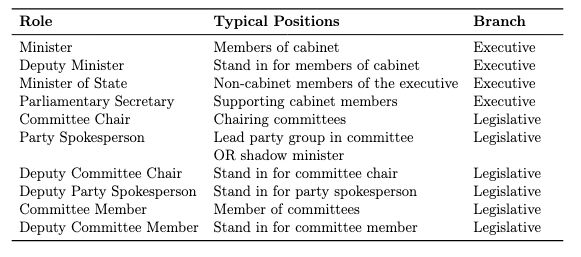I now host all my data on the gesis data site, which is very well maintained, has great admins and is in Europe. Fully recommend!
05.02.2026 07:13 — 👍 1 🔁 0 💬 0 📌 0I now host all my data on the gesis data site, which is very well maintained, has great admins and is in Europe. Fully recommend!
05.02.2026 07:13 — 👍 1 🔁 0 💬 0 📌 0
Today, the European Parliament voted to put the Mercosur trade agreement to the European Court of Justice for review.
It was a politically momentous decision, very tight and carried by an unusual majority, so it is worth looking a bit deeper into it.
Would have really thought these kind of citizenship/democracy issues had a political interest or education effect, interesting. Wonder if people support this for different reasons in different subgroups (i.e. what do they think "certain circumstances" are?)
18.11.2025 20:37 — 👍 0 🔁 0 💬 1 📌 0Something housing related? Giving home owners incentives for building ther first home?
18.11.2025 15:54 — 👍 2 🔁 0 💬 1 📌 0Today’s Omnibus vote has rolled over an already perforated cordon sanitaire in the European Parliament. For the first time, the EPP sided with far-right groups on a file key to the Commission’s agenda. Make no mistake: this was no accident and it’s unclear whether the centrist coalition can recover🧵
13.11.2025 18:05 — 👍 33 🔁 18 💬 3 📌 3These nuanced perceptions hold interesting potential for parties when they try to persuade citizens of a minority government. Stay tuned for more insights on political representation under minority governments from our #MINORITYRULE project!
17.10.2025 12:44 — 👍 2 🔁 0 💬 0 📌 0
Figure of perceptions about minority and majority governments
Despite low knowledge levels and general opposition towards minority governments, citizens believe them to work better with the opposition and listen to the demands of all voters. Meanwhile, they see min. governments as less stable, less able to solve conflicts, less legitimate and less reliable.
17.10.2025 12:44 — 👍 1 🔁 0 💬 1 📌 0
Figure describing preferences for majority and minority government.
Next, we find that citizens dislike minority governments in all countries. In Sweden, only 10% of respondents like them! Especially older voters and government supporters dislike them. Knowledge about minority governments increases opposition towards them.
17.10.2025 12:44 — 👍 0 🔁 0 💬 1 📌 0
Overview of all answers to the knowledge question in the three countries.
More likely to answer correctly? Citizens with ⬆️ education, ⬆️ political interest, older voters, and men (although for men likely due to guessing). Small country differences. Most common mistakes: Minority governments defined by getting less than half of votes or by exclusion of the largest party.
17.10.2025 12:44 — 👍 0 🔁 0 💬 1 📌 0
Estimates of the true knowledge of voters about minority governments and other political information.
Our survey shows that about 1 in 4 citizens can correctly define a minority government (excluding lucky guesses). This is about the same as the share of people that can correctly define the roles of all parties in parliament.
17.10.2025 12:44 — 👍 0 🔁 0 💬 1 📌 0
Screenshot of the start of the paper. Title (Political knowledge and perceptions of minority governments in Europe), authors (Jens Wäckerle and Sven-Oliver Proksch) and journal (European Journal of Political Research)
New from @erc.europa.eu project #MINORITYRULE with @sopro.bsky.social: We study voters’ knowledge about and perceptions of minority governments in 🇩🇰, 🇩🇪 and 🇸🇪.
Link: doi.org/10.1017/S147...
When survey researchers or politicians talk about minority governments, what do voters understand? ⬇️
The German data is not great, I collected it from the member's pages of the individual MPs. Once you have all those in a list (which MP was in which committee per term), combining it with the existing dataset is straightforward (just need to check and jnify names and code policy areas).
08.10.2025 17:04 — 👍 1 🔁 0 💬 0 📌 0This dataset truly was a monumental team effort, it took more than three years to put together. Thanks to everyone who contributed and gave feedback along the way. If you find any errors or have ideas for extensions, please contact us!
08.10.2025 12:58 — 👍 5 🔁 0 💬 0 📌 0
A plot describing the share of women among low, medium and high prestige committees and among members and leadership across the fourteen countries. In almost all cases, women are more likely to serve in low and medium prestige committees and as members rather than leadership.
As a first application, we show that women across all countries are much more likely to be assigned to low and medium prestige committees (coding from WhoGov by @jacobnyrup) and as members rather than leadership. We are excited to see the many ways other people will use this data!
08.10.2025 12:58 — 👍 4 🔁 0 💬 1 📌 0
A table listing the roles minister, deputy minister, minister of state, parliamentary secretary, committee chair, party spokesperson, deputy committee chair, deputy party spokesperson, committee member, and deputy committee member. The first four roles are in the executive branch, the others in the legislative. The table also lists typical positions for each role.
Each position is assigned a role according to the table below. Committee members are by far the most common, but there are other types. We also collect executive positions.
08.10.2025 12:58 — 👍 1 🔁 0 💬 1 📌 0
A table listing the cases in the 14 countries in the dataset. Overall, there are 134295 positions from 1989-11-21 to 2024-12-31. 96.51% of them have Wikidata IDs connected to them.
The dataset covers European countries plus New Zealand and the US from 1989 to 2024. Overall, there are over 130,000 positions! Each entry is one MP’s position for one party within one legislative term.
08.10.2025 12:58 — 👍 1 🔁 0 💬 1 📌 0
New data for legislative scholars! Committee Membership Dataset with @bcastanho.bsky.social, @dmpullan.bsky.social and Firuze Taner:
Committee assignments for all MPs (Wikidata IDs!) in 14 countries
Harmonized roles/policy areas
Data: doi.org/10.7802/2940
Working paper: tinyurl.com/vf54r78p
⬇️
The current consensus in political science is that Nazis hating me and me hating Nazis are both equal parts of the ~polarization problem
18.09.2025 15:12 — 👍 20 🔁 1 💬 2 📌 1Give Tadej Pogacar French citizenship and we'll avoid the runoff!
17.09.2025 09:13 — 👍 3 🔁 0 💬 1 📌 0
Blog post: github.com/sophieehill/...
TL;DR: There are a LOT of errors/inconsistencies in the results reported in this paper (estimates outside CIs, sign errors, duplicates, asymmetric CIs). Even in the abstract itself!
This suggests manual editing of results tables.
Which is not good...
🧵

The social sciences face a replicability crisis. A key determinant of replication success is statistical power. We assess the power of political science research by collating over 16,000 hypothesis tests from about 2,000 articles in 46 areas of the discipline. Under generous assumptions, we show that quantitative research in political science is greatly underpow- ered: the median analysis has about 10% power, and only about 1 in 10 tests have at least 80% power to detect the consensus effects reported in the literature. We also find substantial heterogeneity in tests across research areas, with some being characterized by high power but most having very low power. To contextualize our findings, we survey political methodologists to assess their expectations about power levels. Most methodologists greatly overestimate the statistical power of political science research.
The pretty draft is now online.
Link to paper (free): www.journals.uchicago.edu/doi/epdf/10....
Our replication package starts from the raw data and we put real work into making it readable & setting it up so people could poke at it, so please do explore it: dataverse.harvard.edu/dataset.xhtm...
The "somewhat" is just perfect. How many placebo Europes matter more?? HOW MANY?!
15.08.2025 10:29 — 👍 2 🔁 0 💬 1 📌 0
EPSA have announced that they will hold a conference in July 2026.
😵💫 We understand that there might be some confusion about EPSS and EPSA.
👉🏽 So we thought we would clarify some things.
A short 🧵
It tells us so much about the debate around immigration that the first response by journalists and politicians here is not: does this mean they are over- or underrepresented? This bias and ignorance used to be limited to the most lurid and hateful parts of the media. It is now a standard response.
01.08.2025 08:27 — 👍 106 🔁 31 💬 4 📌 0
I'm adding to the Seoul novelty hats as political science concepts collection:
Comments from Reviewer 2
The end. Shout out to Nyunyu wholesale dongdaemun for an excellent collection.
13.07.2025 07:51 — 👍 4 🔁 0 💬 0 📌 0
10. Political theory
13.07.2025 07:51 — 👍 4 🔁 0 💬 1 📌 0
9. Climate politics
13.07.2025 07:51 — 👍 4 🔁 0 💬 2 📌 0
8. Political behaviour
13.07.2025 07:51 — 👍 3 🔁 0 💬 1 📌 0
7. Social democracy in crisis
13.07.2025 07:51 — 👍 3 🔁 0 💬 1 📌 0